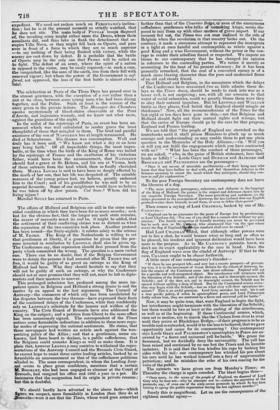The affairs of Holland and Belgium are still in the
same unde- cided condition in which they have been for so many months ; and, but for the obvious fact, that the longer any such state remains, the nearer of necessity must its end be, it might be added, that the settlement of their conflicting claims was as distant as when the separation of the two countries took place. Another protocol has been issued—the Sixty-eighth : it relates solely to the release of M. THORN. The King of the Netherlands is willing to set that gentleman at liberty, if a guarantee be given that the per- sons arrested arrested in retaliation by LEOPOLD shall also be given up. The Conference say, that reparation should first proceed from the party which committed the wrong. The question is a mere verbal one. There can be no doubt, that if the Belgian Government were to detain the persons it had arrested after M. THORN was set free, it would be guilty of as great an outrage as the King of Holland had been. Why they should hesitate to say that they will not be guilty of such an outrage, or why the Conference should not at once promise that they will not, must be left to diplo- matists and their masters to answer.
This prolonged indecision has produced among the more im- patient spirits in Belgium and Holland a strong desire to end the matter by an appeal to the last argument. The Council of Antwerp—the commerce of which city has been annihilated by the disputes between the two thrones—have expressed their fears of the continued delays of the Conference, while they confidently rely on LEOPOLD'S solicitude for the honour and welfare of the country. The Civic Guard of Brussels have also addressed the King on the subject ; and a petition from Ghent to the same effect has been numerously signed. The correspondent of the Times notices some formidable indications in addition to these more regu- lar modes of expressing the national sentiments. He states, that three newspapers had written an article each against the thm- porizing policy of the Allies ; and that a gentleman, name un- known, had been heard to declare, in a public coffeehouse, that the Belgians could unmake Kings as well as make them. It is plain that, however LEOPOLD may contrive to withstand the repre- sentations of the Antwerp Council and the Brussels Civic Guard, he cannot hope to resist three entire leading articles, backed by so formidable an announcement as that of the coffeehouse politician alluded to. The same correspondent, in whom the Leading Jour- nal seems to place great confidence, mentions that a certain IL BOSSELET, who had been engaged as almoner at the Court of brussels, had resigned his office and 2001. a year in a pet. He insinuates that the resignation had its origin in private reasons; but this is doubtful.



























 Previous page
Previous page